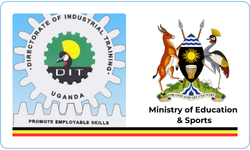Directorate Of Industrial Training

DIRECTORATE OF INDUSTRIAL TRAINING
Ministry Of Education & Sports
" Promote Employable Skills"
- +256 414 259412
- +256 414 251256
- uvqf.dit@gmail.com
Qualifications Standards
The Qualifications Standards department is responsible for developing occupational standards, training modules, compiling and distributing assessment and training packages that are occupational based.
On record, the department has;
– 120 Occupational Profiles.
– Training Modules for 80 occupants.
– Assessment Instrument Banks for 83 Occupants.
– Assessment and Training Packages for 80 Occupants compiled.
Future Plans
– Development of Assessment and Training Packages for Northern Uganda Youth Development Centre (Poultry Farmer and Horticulture)
– Continue with Assessment and Training Packages development.
– Review of existing Assessment and Training Packages.
Uganda Vocational Qualification Framework (UVQF):
Section 20 of the Act establishes the UVQF which is integrated in the DIT quality assurance roles to developing the occupational standards, the assessment and training packages (ATPs), accrediting assessment centers, accrediting assessors, conducting competence based assessments and certification of successful candidates. Section 20 clarifies that UVQF is a mechanism. 10 defines; occupational and assessment standards in the world of work, the award of vocational qualifications to learners who meet the set standards implemented under the formal and non-formal education and training, The UVQF in Uganda, is complemented by the principles of competence based education and training (CBET) and therefore promotes the skills development programmes in the BTVET sub sector through Flexible training /learning modules packaged in the form of ATPs. Learners who on acquisition of employable skills from wherever they are trained from are encouraged to apply to DIT for assessment irrespective of the duration of training, where trained from, medium of assessment, gender or persons with special needs. DIT implements the Competence Based Assessment (CBA) and awards the following qualifications:
a) Modular transcript (partial qualification after undertaking modular assessment in a given occupation)
b) Worker’s PAS (PAS=Practically Acquired Skills), it is a partial qualification alter undertaking modular assessment in a given occupation most especially for apprenticeship individuals in the Informal sector including the JUA KALI’s, Katwe and Kisenyi type of skilled artisans.
c) UVQF level 1: National certificate for individuals who merit in performing the full occupational skills but under supervision.
d) UVQF level 2: National certificate for individuals who merit in performing the full occupational skills under moderate supervision.
e) UVQF level 3: National certificate for individuals who merit in performing the full occupational skills at supervisory level.
I) UVQF level 4: National diploma for individuals who merit in performing the full occupational skills at technician level. I
g) UVQF level 3·CVTl: Certificate in Vocational Training Instruction “ (Offered to BTVET instructors after 9 months CBET programme conducted at Nakawa VTI)
h) UVQF level 4· DVTl: Diploma in Vocational Training Instruction (offered to BTVET Instructors alter 9 months CBET programme conducted at NakawaVT1)
i) UVQF level 5· DTIM: Diploma in Training Institution Management (Offered to BTVET Principals and Head Teachers alter 9 months CBET programme conducted at NakawaVT1) UVQF awards
DIT started issuing the UVQF qualification certificates and transcripts with effect from the year 2009 and therefore phased out the issuance of trade test certificates. Employers should take note of the reforms in the BTVET subsector. With reasonable degree of accuracy, DIT affirms to the employers that every certified individual presenting a UVQF labeled Certificate is able to perform occupational tasks to the level of competence indicated on the qualification certificate.
Career Pathways
DIT under Section 21 01 the BVET Act 2008 is mandated to award certificates and diplomas for the business, technical or vocational education or training conducted under the UVQF in a form prescribed by the minister responsible for education, and such certificates and diplomas are to be recognized in the Uganda education system and by the labour market.
Hence the UVQF under Section 20(5), offers opportunities for students who excel at community polytechnics, vocational schools and training centers be it public or private to proceed 10 the next level of learning. Also, in this respect, all those individuals who are successful through evidence based assessment are encouraged to further their learning at all levels. Even those who acquired skills through the informal sector have a chance to rejoin the formal system; UVQF is the forerunner of the National Qualification Framework (NQF), which shall enable all categories Of learners get opportunities to further their education up to tertiary and university level. This is what constitutes the paradigm shift in democratizing education and training in the BTVET subsector. The ministry of education and sports is flagging the ten year BTVET strategic plan with the main objective of??? Skilling Uganda???. By policy the ministry encourages all BTVET providers in the country to enhance practical skills training to avert youth unemployment Competence is measured in performance terms; therefore employers prefer to employ skilled persons who demonstrate satisfactory attitude in enhancing productivity in a competitive market environment.
